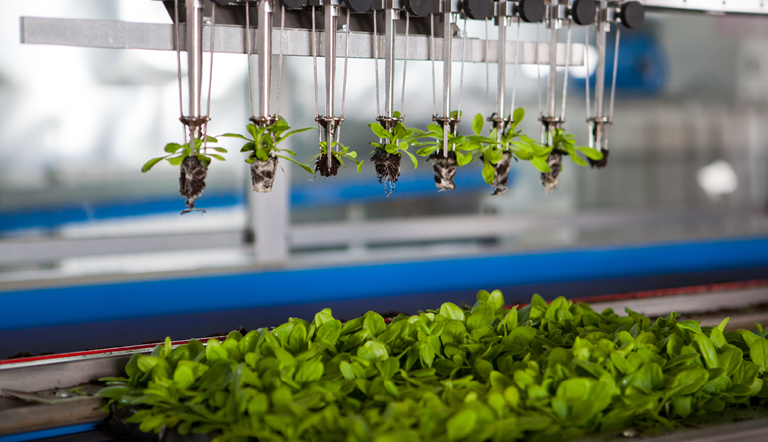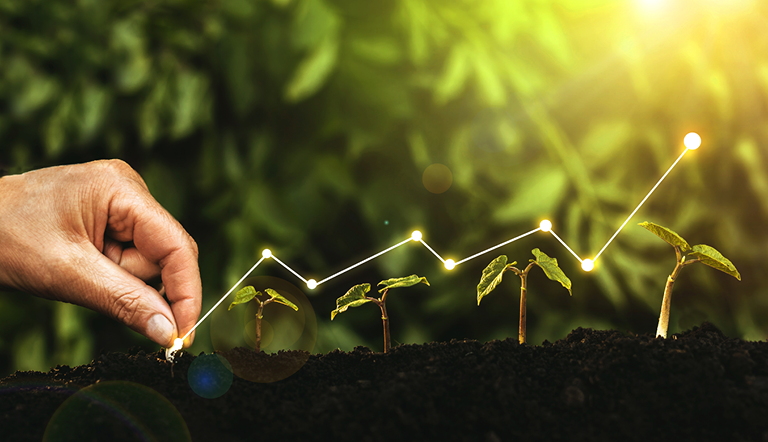
14 Great South African Agritech Solutions

There’s an old term in common use in South Africa: “boer maak ‘n plan”, which means “farmer makes a plan”. While the phrase mentions farmers, it is used to sum up the solutions-oriented mindset of South Africans across all industries.
The inherently innovative environment in the country supports the development of groundbreaking technologies and cutting-edge products that make life better for all South Africans, including farmers. It is therefore not surprising that the SA agricultural technology sector is developing rapidly, showcasing the best of local ingenuity, increasing agriculture production and improving the way we utilise natural resources.
According to an article in TechCrunch, Africa’s agritech sector “grew 44% year-on-year between 2016 and 2019, and the continent has the highest number of agritech services in the developing world” - with “agritech in Africa projected to reach a value of $1 trillion by 2030”. And it’s not only industrial scale farmers who are benefiting: according to Agrilinks, digital innovations across Africa “have helped to increase smallholder yields by as much as 70%, correlating with an average increase of 40% in farmers’ incomes”.
Precision agriculture applications, biotechnology and mobile platforms are just some of the agritech tools being tested and deployed across the country. These include innovative solutions for farmers, such as sensors and tracking systems to monitor soil moisture and health, analytics software that informs data-driven decisions, farm management software, agricultural automation projects, cloud-based pest management and crop protection, GPS systems for field mapping and planning, and monitoring systems for water/irrigation management, weather tracking and livestock. All leading to improved farming efficiency, reduced risks, water and energy savings, and consequently higher yields and improved profit margins, plus a reduction in the reliance on imported food.
And as the agritech industry in South Africa grows, investors have become increasingly interested in providing venture capital to help startups succeed. South Africa is an exciting place for agtech entrepreneurs and investors who are looking to make an impact in the agricultural sector and beyond.
SA Agtech or Agritech Developments
African agritech companies are rapidly evolving and have the potential to revolutionise the country's agricultural industry. Just take a look at some of these home-grown innovations:
- Aerobotics is a data analytics company, providing insights from aerial imagery and machine learning algorithms to “identify areas with nutrient deficiencies, pest infestations, diseases or irrigation issues earlier than ever before … to make data-driven decisions and take action when and where it matters the most” and “track the success of your practices over time”
- “Nosetsa is an ambitious project that began as a school science project that won the Stockholm Junior Water Prize. It is now developed to address some of the world's sustainability challenges of equitable water access against a changing climate as a commercial solution. Based in Limpopo, South Africa, the project seeks to mitigate the two thirds of water that is used in irrigation so that food production is optimised with the same or less water resources to compensate for a growing population.”
- Khula is a software and mobile marketplace app bringing farmers and traders together – a one-stop-shop where farmers can sell their produce direct to traders, export agents, retailers and wholesalers, and buy approved agricultural inputs including seed, fertiliser, agro-chemicals.
- Mezzanine, a member of the Vodacom group, “offers comprehensive solutions for agribusiness to interact and transact with smallholder and commercial farmers in Africa”. Solutions include:
- DigiFarm, “a mobile solution [that] smallholder farmers can efficiently exploit multiple 3rd party products and services to tackle the barriers they face on their path to income resilience, economic success and emancipation”.
- Connected Farmer, “an enterprise mobile enabled solution which ultimately connects agri businesses and smallholder farmers by digitising the existing value chain”.
- MyFarmWeb, “a vendor agnostic precision agriculture digital platform that allows commercial farmers to view consolidated information across domains and suppliers”.
- Biotikum is a “spin-out company of Stellenbosch University” research that “develops and produces microbial additives for the agricultural industry to improve operations in a sustainable manner. Agri-microbial solutions include host-specific animal probiotics, microbial silage inoculants, and soil inoculants. Biotikum aims to become Africa's leading microbial producer, providing high-quality cost-effective microbial solutions to the continent.”
- Revolute Systems offers “a suite of agtech products designed to help farmers maximise their efficiency and yield… Products cover orchard development to harvest, and are designed to reduce costs and improve the quality of food production… The goal is to provide farmers with the tools they need to stay competitive in an ever-changing industry.”
- AquaCheck is a “manufacturer and supplier of quality and affordable capacitance-based soil moisture monitoring equipment, designed to optimise the management of soil water. Products also include self-developed, dedicated irrigation management software and full agronomy support.”
- Ooka provides small scale farmers with a marketplace to sell their fruits, vegetables and other crops.
- GLU Global offers an integration platform “built for client self-sufficiency, enabling innovation at speed” - it has been described as a natural fit for innovation in agriculture.
- Tessara is a manufacturer of preservation sheets intended for grapes, litchis, blueberries, tomatoes and cut flowers markets. The company offers laminated sulphur dioxide-based plastic sheets to protect produce, thereby enabling customers to keep flowers and fruit fresh during transport. It globally markets its products under the Uvasys brand.
- IQ Logistica, besides other services, offers a platform to help farmers “manage all farming operations. The software handles budgeting, inventory and overarching farm information all the way down to the block level. Our performance management tools will help you on your path to achieving greater productivity. Farmers also have the benefit of having access to various services such as insurance and finance.”
- IrriCheck “specialises in holistic agricultural irrigation scheduling software and services”. The proprietary software system, Pulse™, is able to optimise the “irrigation scheduling process, maximising production and ensuring optimal water usage”.
- AgriLED offers solutions for controlled environment agriculture (CEA). These consist of hydroponics systems, LED Grow lamps and automation within shipping containers.
- The ADAMA Grow Mobile App integrates data-driven tools and analytics, allowing suppliers to know when and where to market their products, in addition to having access to reliable data on commodity prices, weather information and crop protection services.
Challenges Facing the Agtech/Agritech Industry
In South Africa, the agtech industry is a relatively new and emerging sector with significant potential for growth; the challenge for founders of these start-ups is how to break into the mainstream due to a lack of available funding, skilled labour and awareness of the potential applications of agtech innovations. Problems with scaling and deploying in rural areas can hamper the growth of startups and prevent them from reaching their full potential.
Another challenge facing the South African agritech industry is the lack of understanding that generally surrounds these technologies. Many traditional farmers in rural communities are not aware of the vast potential of agtech and the subsequent benefit to them; thus, there’s a need for a well-implemented and organised awareness campaign to help spread the message of the capabilities of agritech.
Potential for Future Growth
The potential for growth in South African agritech is immense, and entrepreneurship in this area is in its infancy. With the current rate of technological advancement, there are vast opportunities for agritech startups to thrive. Innovative inventions, partnered with agtech experience, could revolutionise South African agriculture and encourage a shift towards a more sustainable, prosperous future.
The South African government has already implemented incentives and development programmes that encourage agritech growth and the formation of new startups. With a large population in rural areas, and an abundant supply of land, the country is well placed to benefit from the next wave of agritech inventions.
South Africa's deep knowledge of agrarian culture and tradition can be used in combination with modern technology to completely revolutionise the way we approach agriculture and apply innovative farming techniques.
Also, the rise of the African ‘startup nation’ is creating new waves of investment, and the introduction of agritech-specific venture capital companies is helping entrepreneurs to raise funds for their inventions. The private sector has also recognised the potential for ethical, sustainable agritech initiatives, and investments are coming through from companies around the world.
The South African agritech sector has a lot of promise, but it needs careful nurturing and guidance to deliver long-term stability. A clear focus needs to be placed on technology acquisitions and formalising collaborations between agritech startups. If these policies are effectively implemented, then the country is well placed to take advantage of this growth and benefit from future agritech inventions.
Read ADAMA’s other articles about precision farming, how agritech is fighting climate change, robotics and Artificial Intelligence in agriculture and how citrus growers are using drones to increase crop yield.



